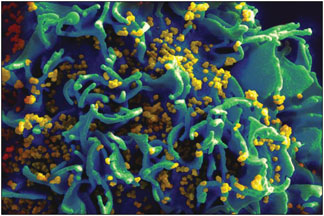

NIH scientists discover how HIV kills immune cells
By Black AIDS Institute
Findings Have Implications for HIV Treatment
Untreated HIV infection destroys a person’s immune system by killing infection-fighting cells, but precisely when and how HIV wreaks this destruction has been a mystery until now. New research by scientists at the National Institute of Allergy and Infectious Diseases, part of the National Institutes of Health, reveals how HIV triggers a signal telling an infected immune cell to die. This finding has implications for preserving the immune systems of HIV-infected individuals.
HIV replicates inside infection-fighting human immune cells called CD4+ T cells through complex processes that include inserting its genes into cellular DNA. The scientists discovered that during this integration step, a cellular enzyme called DNA-dependent protein kinase (DNA-PK) becomes activated. DNA-PK normally coordinates the repair of simultaneous breaks in both strands of molecules that comprise DNA. As HIV integrates its genes into cellular DNA, single-stranded breaks occur where viral and cellular DNA meets. Nevertheless, the scientists discovered, the DNA breaks during HIV integration surprisingly activate DNA-PK, which then performs an un-usually destructive role: eliciting a signal that causes the CD4+ T cell to die. The cells that succumb to this death signal are the very ones mobilized to fight the infection.
According to the scientists, these new findings suggest that treating HIV-infected individuals with drugs that block early steps of viral replication—up to and including activation of DNA-PK and integration—not only can prevent viral replication, but also may improve CD4+ T cell survival and immune function. The findings also may shed light on how reservoirs of resting HIV-infected cells develop and may aid efforts to eliminate these sites of persistent infection.
A Cooper et al. HIV-1 causes CD4 cell death through DNA-dependent protein kinase during viral integration. NatureDOI: 10.1038/nature12274 (2013).
NIAID Director Anthony S. Fauci, M.D.; Arik A. Cooper, Ph.D., staff scientist in the Virology Laboratory of the NIAID Vaccine Research Center; and Costas Petrovas, Ph.D., staff scientist in the Immunology Laboratory of the NIAID Vaccine Research Center, are available for comment.
To schedule interviews, please contact Laura S. Leifman, (301) 402 1663, niaidnews@niaid.nih.gov.
By National Institute of Allergy and Infectious Diseases: NIAID conducts and supports research—at NIH, throughout the United States, and worldwide—to study the causes of infectious and immune-mediated diseases, and to develop better means of preventing, diagnosing and treating these illnesses. News releases, fact sheets and other NIAID-related materials are available on the NIAID Web site at www.niaid.nih.gov.
About the National Institutes of Health (NIH): NIH, the nation’s medical research agency, includes 27 Institutes and Centers and is a component of the U.S. Department of Health and Human Services. NIH is the primary federal agency conducting and supporting basic, clinical, and translational medical research, and is investigating the causes, treatments, and cures for both common and rare diseases. For more information about NIH and its programs, visit www.nih.gov.


Be the first to comment